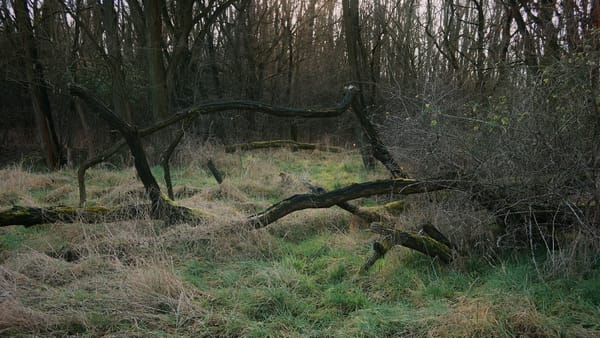Klute interview (November 2000)
Before launching his label Commercial Suicide in 2001 I talked to Klute about being an outsider in drum and bass.

The interview took place in November 2000 as part of the Skunkrock Records tour, which also led to the Conne Island, Leipzig. During an exclusive session for the netradio contour.net I interviewed a friendly but somewhat tired Klute.
Booga: Paradox chose the title ‘Musician as an Outsider‘ for its recently released album. Would you say that it's a statement that applies to you in a certain way?
Klute: Mmmh, I would say that's not so far off. But I like this title that he chose. I think that I am also an outsider, I don't mean that primarily in relation to drum & bass, but in general, in everything I do.
What is the background to this?
You know, just my life, what I've done so far. How I grew up, the music I made and make, all that. When I was still doing punk rock, I was always a bit outside the usual clichés and rules. That's just because I try to do my own thing.
So ‘Musician as an Outsider‘ can also be understood as a stance against the popular zeitgeist in drum & bass?
Probably, I think that's what Paradox was trying to say. Maybe he wanted to express in this way that he is separated from this established drum & bass thing. I have a similar opinion.
The label that puts out your records is called Certificate 18, is that supposed to suggest that you are the adults in the scene?
The guy who runs the label (Paul Arnold) has been doing it since 1991 now, and when he started it was more of a bad boy thing for him. In England, films are usually labelled with a note like this to indicate that the film is not allowed under 18.
Does this bad boy image still holds for Certificate 18 today?
I just think it's a good name. I've been associated with the label for so many years now and never thought about the meaning behind the name. But somehow it can be explained. Imagine a 12-year-old who sees a "Certificate 18" film standing around somewhere. It's something exclusive and desirable for him, well, I've also seen films like that when I was 12 and 13 ...
So Certificate 18 stands for a higher level?
I don't think so. Other people might think so. But I don't know. Take Paradox with "Musician as an Outsider". It's like, if you do something that pursues new directions, it's usually called intellectual or too intelligent. For me that's total nonsense, but most people always try to generalise. If it's not so simple and obvious for them, then it's immediately said that it's made for intelligent people, which of course I don't agree with, because for example the guy who runs the label is quite dim ...
What?
I'm joking.
Maybe that's already the answer to my next question, about what separates the producers and artists at Certificate 18 from the rest.
I can only speak for myself. And I'm a bit peculiar, but that's just me. I'm always suspicious of crews or antics that make a statement like: Yes, we are this. Yes, we are that. In the end, I prefer to rely on myself. And my friends. But not on any crews. Do you understand what I'm saying?
I see, of course. But let's move on to your new album. How would you describe the development from "Casual Bodies" to your new LP "Fear of People"? For example, did the production style change?
I didn't change the production style much. I produced both albums on almost the same equipment. But the second album is more relaxed from the point of view that it's the music I really want to make and I personally got more involved in the music. The production style has improved over time anyway, I have acquired more knowledge in handling the equipment.
Your track "Phone Call" is so refreshing especially at this time, because it's so different. Do you think lowering tempo is an alternative approach to think about breakbeats again?
I don't really know ...
I think of people like Photek and Hidden Agenda, for example, who don't follow the beaten track. I think that is important because that way they're reinvigorating the sound.
I think it is just realising what it's all about. It's all about your own life. And it's about realising that there is a life far away from constructed schemes, even in drum & bass. It helps you immensely to try other styles, to experiment with downtempo or to do other things. That way you experience things outside your previous field of vision and the usual routine. That's how I see it for me. I think music is music. And drum & bass is music and I think it hurts the music when people get stuck on certain things, because at the end of the day it's all about expressing yourself personally.
So you're showing us some different colours?
I just call it music. That's what I do. And I wanted to do more of that on my album. And the tracks that you can't classify as drum & bass, I wouldn't put them in any other categories because of that. Other people do that, but so what? I'm way too busy producing drum & bass to be looking to follow other scenes or genres.
And do you think that we will hear more material from you or other producers in the near future that goes more in this more musical direction?
Yes, I think more and more people are going in that direction. Either they are tired of it or maybe there are people who just produce what they like without worrying about whether it sounds "different" now. And I think that's how Photek produced his album. He just made the record he wanted to make instead of releasing a pure drum & bass album.
What experiences have you made with regard to the expectations of the audience during your DJ tour?
If you look at it this way, almost everyone who plays Drum & Bass plays the same way. That's a strong fucking generalisation, but in the end everybody mixes one record into another. And I'd say if you ask the crowd what they want, 99 times out of 100 they'll tell you they want you to play hard records.
Well, then I'll ask differently: Are there any special expectations of the audience that you wouldn't fulfil within that framework?
I don't mind playing hard. I like louder stuff, you know I have a punk background. I just like to present a wide range. Variety can often create special moods. Playing a hard smasher after a soft tune or the other way around can have quite an effect. For some people it's still not obvious enough and you can tell they don't know what to do. I think that's exactly the thing that happens with most productions nowadays. It's just all too obviously produced for the dance floor. The producers just know that people are going to freak out when they hear some killer basslines. I would prefer it if the music for the dancefloor would gain more depth again.
As a DJ, would you take the risk of trying to take people on a journey with your set?
Yes, I play the things I want to. But, as I said, I play everything. Just as much the hits to get people going. That's also fun for me.
When we have a UK DJ as a guest here in Leipzig, we usually already have a certain expectation based on the label, so whether it will be more experimental and tricky. We know the artists and DJs from their productions, but when they are playing out, they stick to the hits. Sometimes I wonder if they never listen to other things, or what's the reason for that?
I think a lot of people in the drum & bass scene today really don't. I'm also very surprised at all these old school remixes and the reaction when people hear them. I wouldn't let people remember all those tracks. But who knows. I'm not in a position to judge.
The following exchange of words was made in a very relaxed mood and explicitly does not refer to a quote in which Skunkrock say that they have already left their mark in Drum & Bass history. It was rather a joking allusion in the direction of Alley Cat and was not meant to be a disrespect to Skunkrock.
Skunkrock Productions say about themselves that they have left their mark on drum & bass history.
Skunkrock? Yes, they say that.
Alley Cat steps in: "Watch your mouth!" (big laughter)
Oh, crap!!! (face puckers "caught")
What do you think about Skunkrock and its development, with what intention did you approach your collaboration?
I already like Skunkrock a lot. I've known Mark, who runs the label, for a few years. I even think that I met Mark for the first time here at the Conne Island in Leipzig, about four years ago. He has always been a very honest and thorough person and I like his kind. When he started his label, I was always interested to see how it was going. And they have already put out some very good stuff, definitely.
So is it even a friendly relationship beyond business?
Yes, I think it's both.
And what will the future bring for Skunkrock? Will this 'track remixed by a bigger artist' that was needed to enter the UK market fade into the background?
I don't know. I think their own tracks have enough substance that these remixes are no longer superficially needed. Of course it was helpful to draw attention to the label with these remixes, but it's time to take the next step.
I liked your remix a lot, it was very light and uplifting. I thought it was very good fit.
Thank you, I like to hear that.
What are your next plans in relation to Certificate 18?
I'm still in the process of promoting my album ‘Fear of People‘. I'm going on tour, next I'll be in America for example. After that in Austria. Next year I hope to find a few days to go to Australia. Then we're still negotiating the next releases from the album, possible collaborations, remixes and things like that. After that I'm not sure yet. I'll probably start my own label, but I'll still release on Certificate 18. And I want to emphasise the musical aspects in my productions even more, not just do drum & bass.
The interview originally appeared in German on the Leipzig drum and bass website breaks.org in November 2000.




